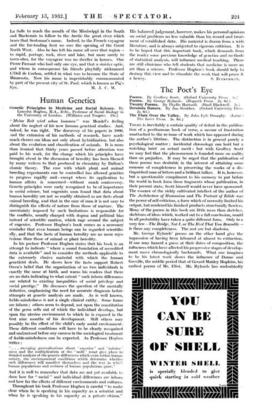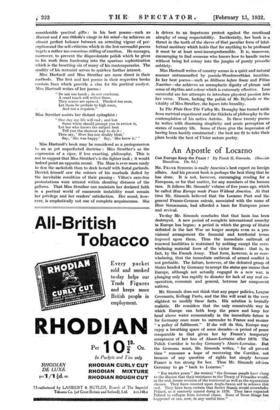The Poet's Eye
Ia. lid.)
The Flute Over the Valley. By John Lyle Donaghy. (Lame :
The Inver Press. ls. ad.)
TitERI: is inevitably a certain quality of defeat in the publica- tion of a posthumous book of verse, a savour of frustration unattached to the re-issue of work which has appeared during the author's lifetime. The distinction is in general purely a psychological matter ; incidental chronology can hold but a watching brief on actual merit : but with Geoffrey Scott we nosy feel that the phenomenon is founded inure on reality than ou prejudice. It may be urged that the publication of these poems was- desirable in the interest of attaining sonic measure of completeness in preserving the works of a dis- tinguished man of letters and a brilliant talker. It is, however, but a questionable compliment to his memory to put before the world in book form these fragments whose publication, in their present state, Scott himself would never have sponsored. 'lime essence of the richly cultivated intellect of the author of The Architecture of Humanism and The Portrait of zahk was the power of self-criticism, a force which of necessity limited his output, but rendered his finished products structurally flawless. Many of the poems in this book are little more than sketches, skeletons of ideas which, worked out to a full conclusion, would in all probability have taken a quite different form. Only in a very few—The Bridge, Not 1, or The Bird That You Resemble— is there any completeness. The rest are but sliadoWs.
Mr. George Rylands' poems on the other hand give the impression of having been laboured at almost to extinction. If one may hazard is guess at their dates of composition, the influences which have affected his progressive stages of develop- ment move chronologically backwards. What one imagines to be his latest work shows the influence of Donne and Gretille, the middle-period that of Gerard Manley Hopkins, his earliest poems of Mr. Eliot. Mr. Rylands has undoubtedly considerable poetical gifts : in his best poems—such as . Harvest and I smo Othello's visage in his mind—he achieves an almost perfect balance between an arresting vigour of per- ception and the self-ciiticiim Which in the lesi nieces:36d poems begets a rather too conscious stifling of emotion. He manages, moreover, to prevent the dispassionate polish which he gives to his work from hardening into the spurious sophistication which is the besetting sin of many of his contemporaries. The quality of his restraint serves to quicken further interest.
Miss Hartnoll and Miss Struther are more direct in their methods. The fast and last poems in their respective books contain lines which provide a clue for the poetical analyst. Miss Hartnoll writes of her poems
" Be not too harsh ; do not condemn.
A cruel touch will wither them.
They scarce are opened. Plucked too soon,
Let them be prelude to high noon, And not a requiem."
Miss Struther assists her distant epitaphist :
" One day my life will end ; and lest Some whim should prompt you to review it, Let her who knows the subject best Tell you the shortest way to do it : Then say, ` Here lies one doubly blest.'
Say, ` She was happy.' Say, ' She knew it " Miss Ilartnoll's book may be considered as a prolegomenon to an as yet unperfected doctrine : Miss Struther's as the expression of a riper, if less exacting, philosophy. This is not to suggest that Miss Struther's is the lighter task ; it would indeed point an opposite moral. The Muse is ever more ready to don the sackcloth than to deck herself with festal garlands. Herrick himself saw the colours of his rosebuds dulled by the inevitable condition of their passing : Villon's care-free protestations were uttered within shouting distance of the gallows. That Miss Struther can maintain her declared faith in a poetical world of macaronic instability must remain her privilege and her readers' satisfaction. Her mood, how- ever, is emphatically not one of complete acquiescence. She • is driven to an impetuous protest against the emotional atrophy of smug respectability. Incidentally, her book is a thrust in the teeth of the slaves of that peculiar form of intel- lectual snobbery which hold.i that for anything to be prefound it must be at least semi-incomprehensible. It is, moreover, encouraging to find someone who knows how to handle metre without being led astray into the jungles of purely prosodic' subtlety.
Miss Hartnoll writes of country scenes in a quiet and natural manner untrammelled by pseudo-Wordsworthian inanities. In her best poems—such as Stillness before Snow and Filius Naseitur—she achieves an unemphatic dignity of phrase and sense-of rhythm and colour which is extremely effective. Less- successful are her attempts to introduce physical passion into her verse. There, lacking the polish of Mr.-Rylands or the vitality of Miss Struther, she lapses into banality.
In The Flute Over The Valley Mr. Donaghy has turned aside from metrical experiment and the thickets of philosophy to the contemplation of his native Antrim. In these twenty poems he writes with disarming simplicity and acute perception of scenes of country life. Some of them give the impression of having been hastily -constructed : the best are fit to take their place beside the best of Ulster nature poetry.







































 Previous page
Previous page